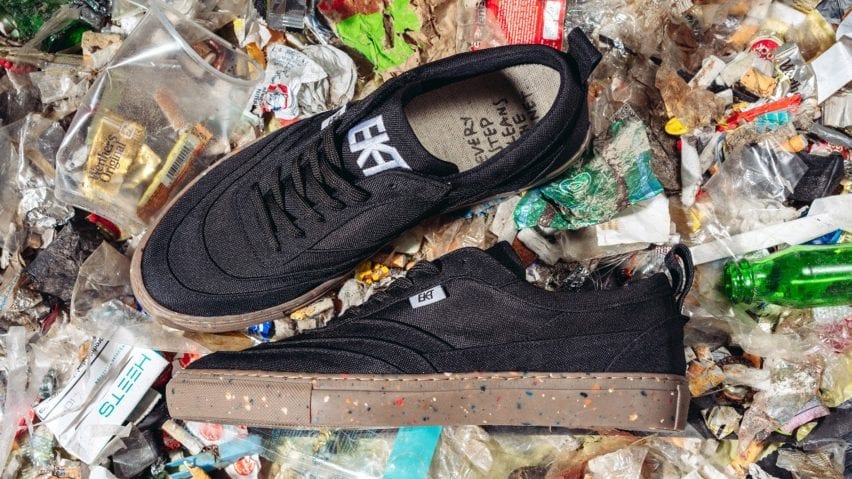Vienna-based footwear startup Effekt Footwear has made a trainer called Alchemy-X from 90 per cent recycled materials, including ocean plastic and waste from the fashion industry.
Each pair of trainers is made with an average of 775 grams of recycled textile waste, reclaimed rubber and recovered ocean plastic, according to the brand.
"We wanted to make a sneaker that set the bar for sustainability and would create a positive impact for the planet," said Effekt Footwear founder Ben Smits.
The trainer is named after the medieval practice of attempting to turn scrap metal into gold.
"Just as the medieval chemist was trying to turn base metals into gold, we're using '21st-century alchemy' to turn trash into trainers," said Smits.
"We wish to create value from cleaning up our planet, create a business case for upcycling and help re-frame people's perception of waste materials."
Effekt Footwear's low rise trainer comes in a paired-back design featuring a recycled upper lining made out of reclaimed ocean plastic and recycled textiles.
Textile scraps, off cuts and other scrap materials from the Portuguese textile industry, are recovered before being sent to landfill. Materials such as cotton are then broken down and spun back into new yarn for the trainers.
The company's European supplier gathers material from a number of sources including fisherman and beach clean-up initiatives along the Mediterranean Sea.
Plastic from the ocean floor, floating on the ocean surface as well as from rivers, estuaries and aquatic environments that lead to the ocean is collected to make the shoes.
The material is then coloured with ecological dyes and finished by hand in a family-owned workshop in Portugal.
The sole is comprised of at least 70 per cent rubber waste that was destined to end up in landfill. A small percentage of it is made from new rubber to ensure the soles are durable and long-lasting. Organic cotton in the stitching, embroidery and woven tag is the only other new material used.
According to Smits, the result is "a sneaker that contains 90 per cent recycled material and can be easily recycled at its end of life."
While the entire insole is biodegradable, the rest of the shoe is "designed for easy recycling with suppliers". Customers can participate in the Effekt Collekt program whereby their trainers will be taken back and recycled by Effekt after wear.
"I do not suggest people dispose of our soles in the garden or in nature because there is a difference between biodegradable and compostable," said Smits. "As with many biodegradable materials and plastics which are coming into the market, it is suggested that they are managed through commercial biodegradation."
Trainers returned to by Effekt Footwear are broken down into new materials which can be reused again.
Smits believes that the minimal design will enable the Alchemy-X to be worn more often, as it can work with a range of outfits.
"While we didn't copy the silhouettes of a Converse or a Vans, we did take the characteristics of their simple, iconic cuts to create a sneaker that can be worn by everyone and with a variety of outfits," Smits explained.
"One shoe, many styles. That's the cornerstone of a sustainable sneaker."
"We envision those who wear these sneakers to be leaders, visionaries and people actively working to leave the planet in a better condition than we found it."
"This is why we have partnered with the Kahana Foundation for this project. Portions of the sale of our sneakers will help them continue their great work in Hawaii to inspire youth and influence government to work toward a better tomorrow."
With Alchemy-X, which are available via a Kickstarter, Effekt Footwear aims to help clean up the planet through upcycling waste into raw material, allowing customers to create a positive impact and reduce their carbon footprint.
For Smits, this is the most impactful way of saving our global oceans and ecosystems.
"Personally, if producers are serious about using recycled materials, lowering their carbon footprint, employing ethical labor and opting into extended producer responsibility, then this is far more impactful than planting a tree and calling it a day."
The footwear brand is one of a growing number of companies recycling ocean plastic to create clothing items. Sportswear brand Adidas and environmental initiative Parley for the Oceans have collaborated a number of times to create shoes made from waste plastic found on seashores.

